Awareness resources for opioids
Opioid education resources including videos, factsheets, posters and more.
On this page:
| Title | Description | |
|---|---|---|
 |
End stigma campaign | Stigma matters because it can prevent people who use drugs from getting help. People who are stigmatised often feel ashamed, alone and judged. Together we can help end stigma. |
 |
Good Samaritan Drug Overdose Act | Stay until help arrives. The Good Samaritan Drug Overdose Act can protect you. |
 |
It takes strength to ask for help with addiction | Substance use and addiction impact men more than others. No one should have to face it alone. |
| Title | Description | |
|---|---|---|
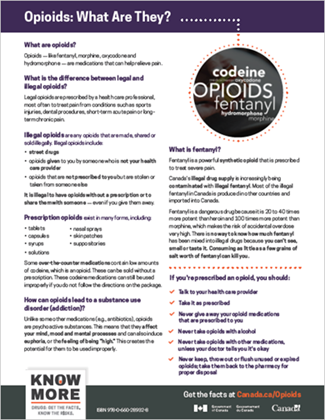 |
Opioids: What Are They? | This fact sheet provides information on what opioids are, the difference between legal and illegal opioids and what you should do if you are prescribed an opioid. |
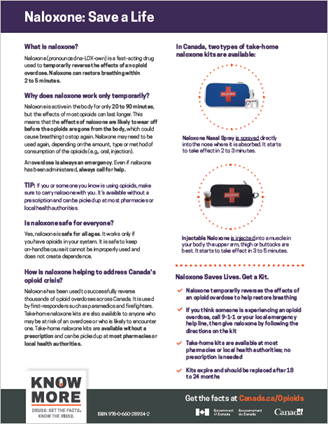 |
Naloxone: Save a Life | This fact sheet provides information on naloxone and how it can save a life during an opioid overdose. |
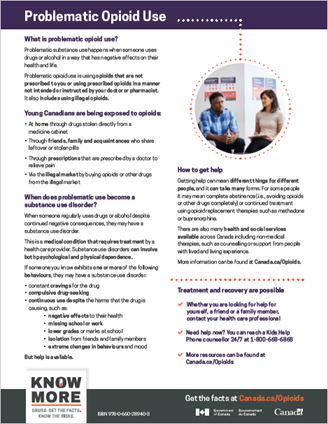 |
High-Risk Opioid Use | This fact sheet provides information on high-risk opioid use and how to get help. |
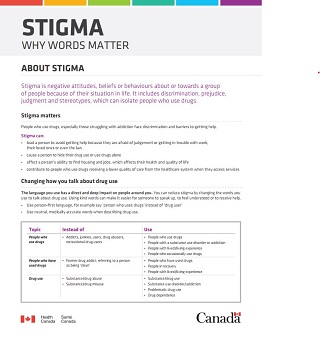 |
Stigma: Why Words Matter | This fact sheet provides information on stigma, why our words matter and how stigma can affect people who use opioids. |
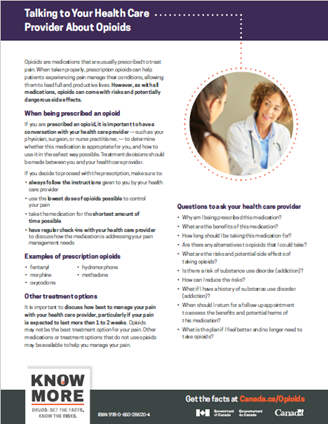 |
Talking to Your Health Care Provider About Opioids | This fact sheet provides information that can help when talking to a health care provider about opioids. |
| Title | Description | |
|---|---|---|
 |
How to administer naloxone | Step-by-step instructions on how to administer naloxone to someone experiencing an opioid overdose. |
 |
Opioid overdose: Wallet card | This wallet card can be printed or ordered. It can increase awareness of the symptoms of an opioid overdose, the steps to take to save a life, and protections provided by the Good Samaritan Drug Overdose Act. |
 |
Opioid overdose: poster | This poster can be printed and displayed at public events or within the community. It can increase awareness of the symptoms of an opioid overdose and the steps to take to save a life. |
 |
Good Samaritan Drug Overdose Act: poster | This poster can be printed on letter sized paper or scaled to print larger. It tells Canadians what to do in the case of an opioid overdose and where to get information on the Good Samaritan Drug Overdose Act. |
 |
Know More: Your first time could be your last time | This poster is intended to increase awareness of the dangers of fentanyl and opioid overdoses. |
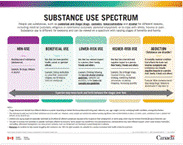 |
Substance Use Spectrum | Substance use is different for everyone and can be viewed on a spectrum with varying stages of benefits and harms. A person may move back and forth between the stages over time. |
| Title | Description | |
|---|---|---|
 |
Meagan's Story | Hear Meagan's story about how her prescription drug use quickly turned into high-risk substance use. Also find out how she got treatment. |
 |
Tom's Story | Discover Tom's story about his dependence on painkillers, how it took over his life and how treatment helped. |
 |
Jordan's Story | Listen to Jordan's story and how his dependence on pain medication led to tragedy. |
 |
Karlee's Story | Listen to Karlee's story about her prescription drug use, its negative effects on her life and how she recovered. |
 |
Etienne's Story | Listen to Étienne's story about how his prescription drug use took over his life, and how therapy helped him recover. |
 |
Marie-Louise's Story | Listen to Marie-Louise's story about how one pill to help her sleep led to 6 years of prescription drug use, and even jail. Also find out how she got help and recovered. |
 |
Kristina's Story | Discover Kristina's story. She is a registered practical nurse who specializes in drug treatment. Every day she sees people suffering from the effects of high-risk opioid use. She wants anyone struggling with substance use to know that there are options, and there are really good people out there to help. |
 |
Samuel's Story | Hear Samuel's story about his substance use, especially opioids, the negative effects it had on his health and life in general, and how he recovered. |
 |
In Plain Sight | In Plain Sight is a Health Canada audio series that explores the personal stories of people affected by the opioid crisis. |
| Title | Description | |
|---|---|---|
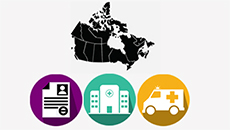 |
Opioid- and Stimulant-related Harms in Canada | Access the most recent data on apparent opioid and stimulant toxicity deaths; Opioid- and stimulant-related poisoning hospitalizations; and Emergency Medical Services responses to suspected opioid-related overdoses. |
 |
Health Canada's Drug Analysis Service Laboratories | Health Canada's Drug Analysis Service Labs analyze illegal drugs seized by law enforcement agencies. |
| Title | Description | |
|---|---|---|
 |
This overview identifies the actions taken by the Government of Canada since early 2016 to address the overdose crisis. It also provides a national picture of the public health impact of opioids in Canada. |